Mental Health Social Work Report: Sanjeev's Case Study Analysis
VerifiedAdded on 2023/01/17
|9
|2215
|34
Report
AI Summary
This professional report, authored by a mental health social worker, details the case of Mr. Sanjeev, a 32-year-old Indian man living in Australia, who sought treatment for mental health issues stemming from the denial of his refugee appeal based on his sexual orientation. The report outlines the biopsychosocial assessment, treatment procedures including psychotherapy, and the patient's emotional responses. Sanjeev's background includes a rigid upbringing in India, where his sexual orientation was considered taboo, leading to emotional distress and fear of societal stigmatization. The report includes the waiver of confidentiality, summary of treatment, and the patient's history, highlighting his struggles with isolation, suicidal ideation, and his journey through psychotherapy. The report concludes with recommendations for further psychological therapy, including involving his parents in the treatment and connecting him with support networks. The author also suggests a multidisciplinary approach and follow-up assessments.
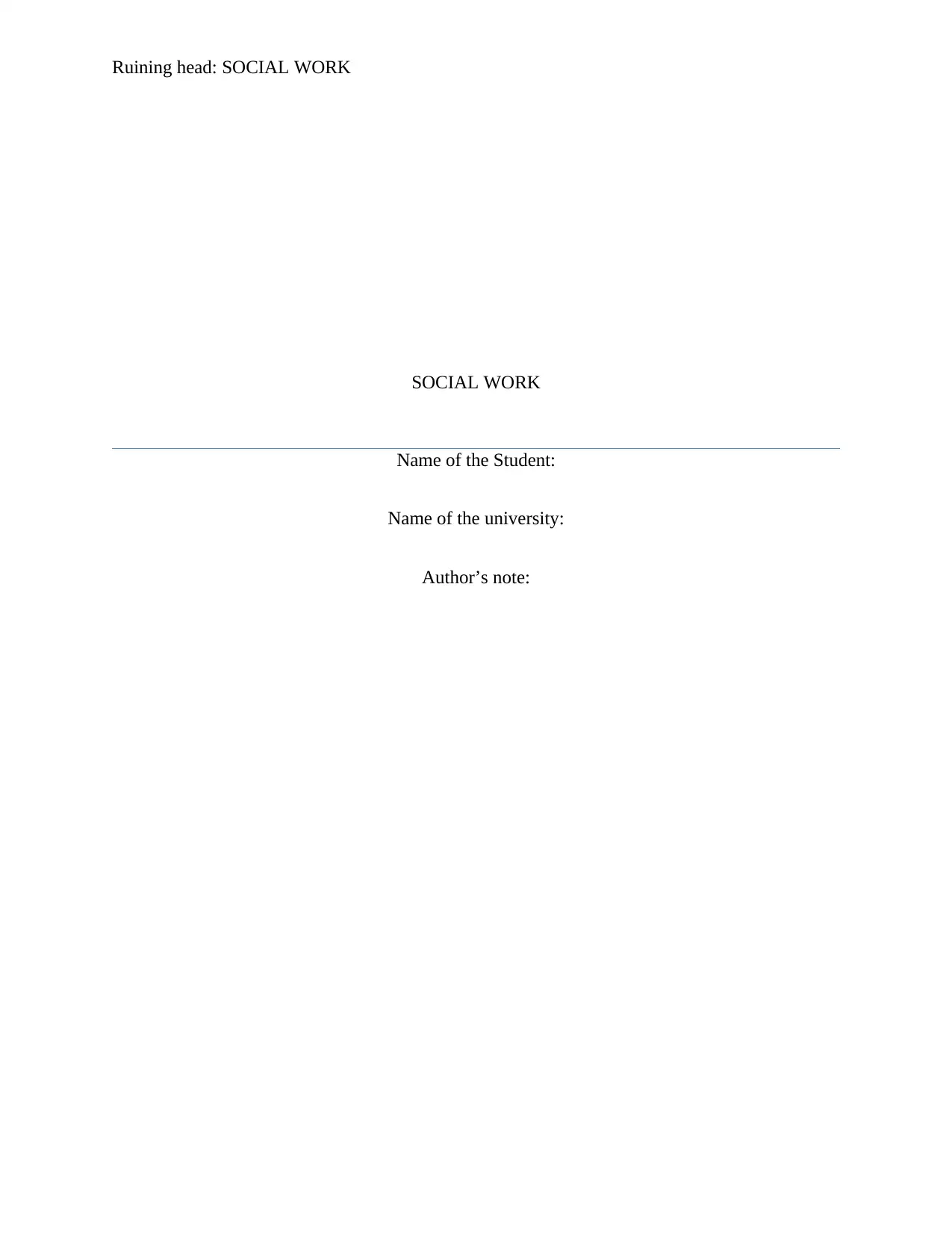
Ruining head: SOCIAL WORK
SOCIAL WORK
Name of the Student:
Name of the university:
Author’s note:
SOCIAL WORK
Name of the Student:
Name of the university:
Author’s note:
Paraphrase This Document
Need a fresh take? Get an instant paraphrase of this document with our AI Paraphraser
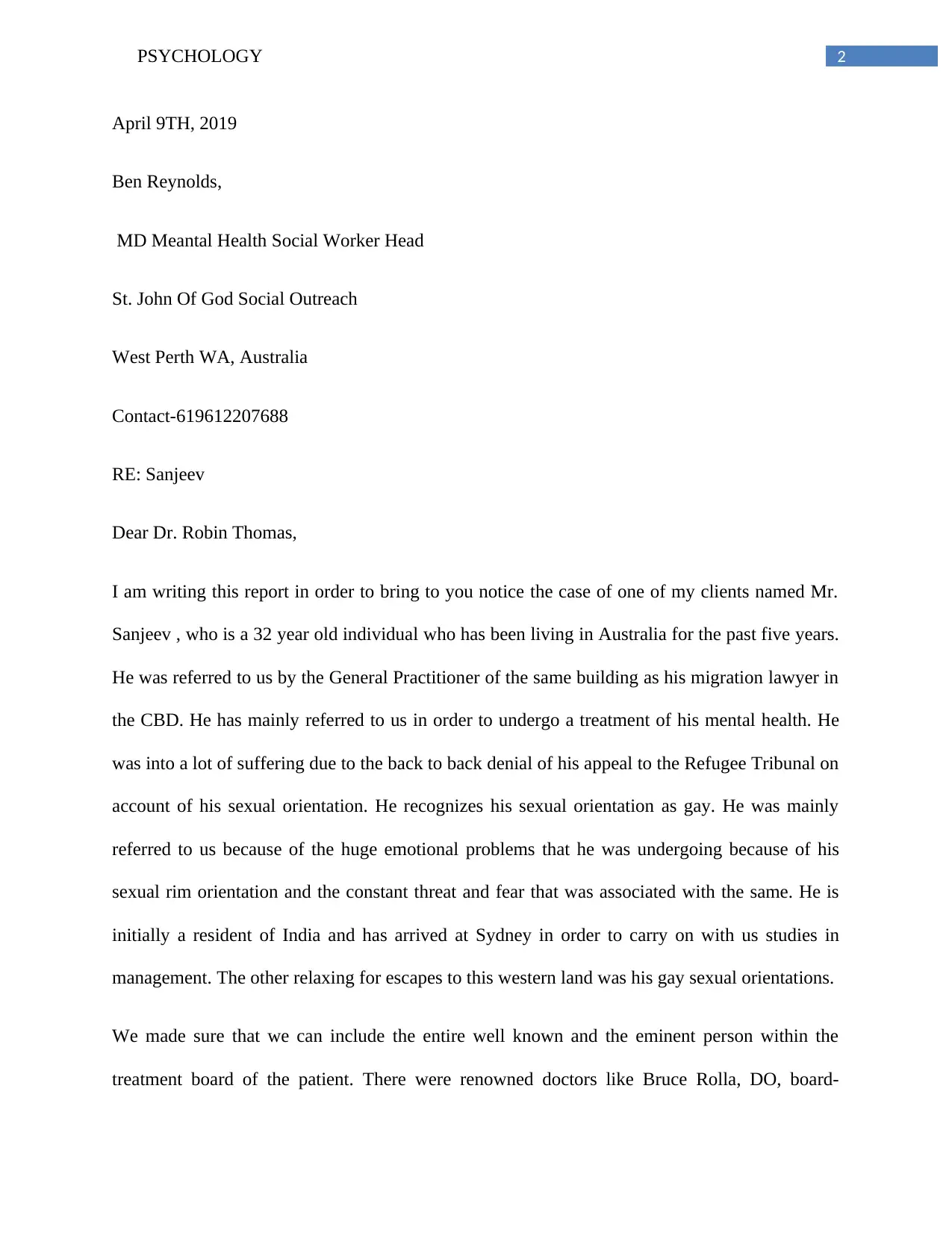
2PSYCHOLOGY
April 9TH, 2019
Ben Reynolds,
MD Meantal Health Social Worker Head
St. John Of God Social Outreach
West Perth WA, Australia
Contact-619612207688
RE: Sanjeev
Dear Dr. Robin Thomas,
I am writing this report in order to bring to you notice the case of one of my clients named Mr.
Sanjeev , who is a 32 year old individual who has been living in Australia for the past five years.
He was referred to us by the General Practitioner of the same building as his migration lawyer in
the CBD. He has mainly referred to us in order to undergo a treatment of his mental health. He
was into a lot of suffering due to the back to back denial of his appeal to the Refugee Tribunal on
account of his sexual orientation. He recognizes his sexual orientation as gay. He was mainly
referred to us because of the huge emotional problems that he was undergoing because of his
sexual rim orientation and the constant threat and fear that was associated with the same. He is
initially a resident of India and has arrived at Sydney in order to carry on with us studies in
management. The other relaxing for escapes to this western land was his gay sexual orientations.
We made sure that we can include the entire well known and the eminent person within the
treatment board of the patient. There were renowned doctors like Bruce Rolla, DO, board-
April 9TH, 2019
Ben Reynolds,
MD Meantal Health Social Worker Head
St. John Of God Social Outreach
West Perth WA, Australia
Contact-619612207688
RE: Sanjeev
Dear Dr. Robin Thomas,
I am writing this report in order to bring to you notice the case of one of my clients named Mr.
Sanjeev , who is a 32 year old individual who has been living in Australia for the past five years.
He was referred to us by the General Practitioner of the same building as his migration lawyer in
the CBD. He has mainly referred to us in order to undergo a treatment of his mental health. He
was into a lot of suffering due to the back to back denial of his appeal to the Refugee Tribunal on
account of his sexual orientation. He recognizes his sexual orientation as gay. He was mainly
referred to us because of the huge emotional problems that he was undergoing because of his
sexual rim orientation and the constant threat and fear that was associated with the same. He is
initially a resident of India and has arrived at Sydney in order to carry on with us studies in
management. The other relaxing for escapes to this western land was his gay sexual orientations.
We made sure that we can include the entire well known and the eminent person within the
treatment board of the patient. There were renowned doctors like Bruce Rolla, DO, board-
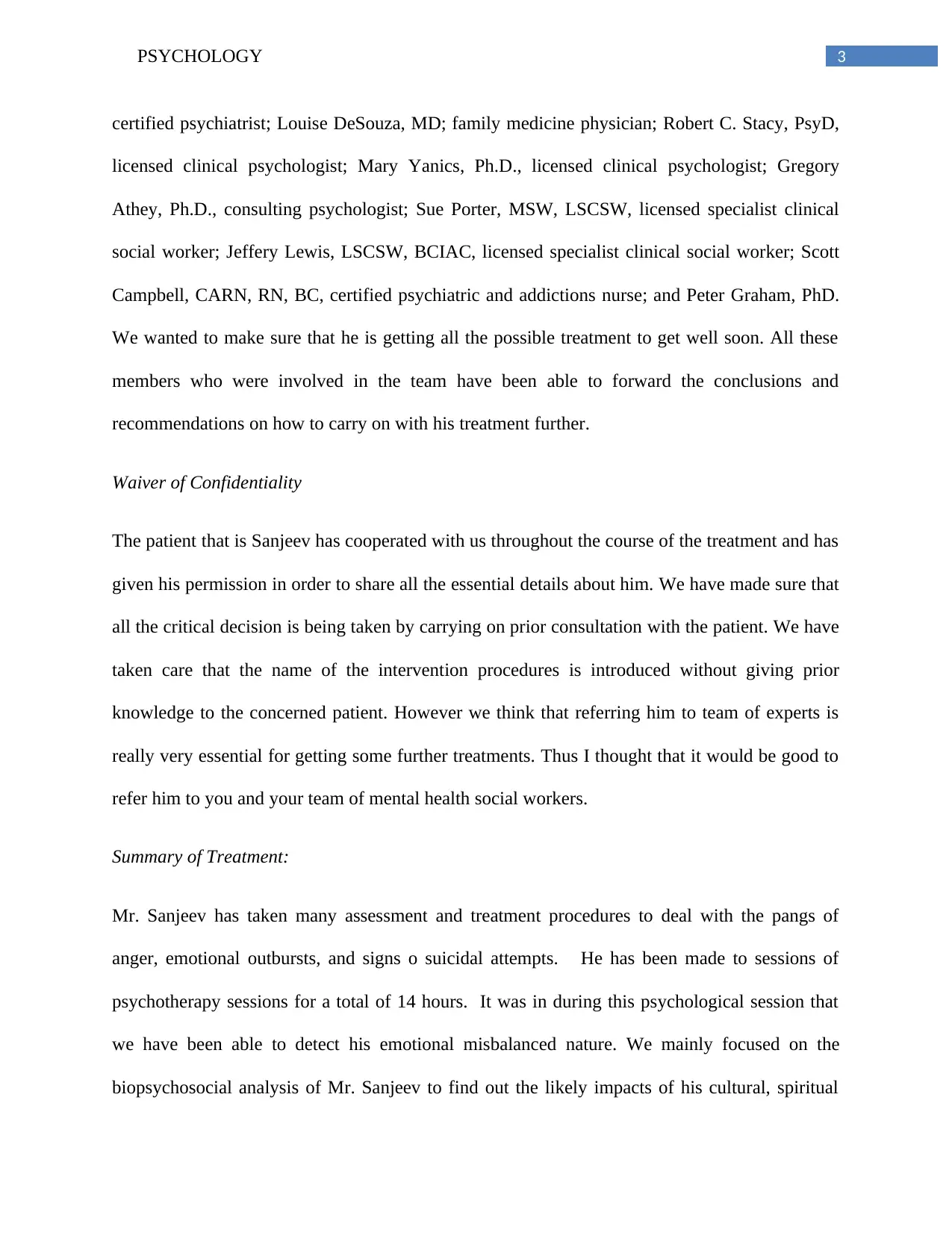
3PSYCHOLOGY
certified psychiatrist; Louise DeSouza, MD; family medicine physician; Robert C. Stacy, PsyD,
licensed clinical psychologist; Mary Yanics, Ph.D., licensed clinical psychologist; Gregory
Athey, Ph.D., consulting psychologist; Sue Porter, MSW, LSCSW, licensed specialist clinical
social worker; Jeffery Lewis, LSCSW, BCIAC, licensed specialist clinical social worker; Scott
Campbell, CARN, RN, BC, certified psychiatric and addictions nurse; and Peter Graham, PhD.
We wanted to make sure that he is getting all the possible treatment to get well soon. All these
members who were involved in the team have been able to forward the conclusions and
recommendations on how to carry on with his treatment further.
Waiver of Confidentiality
The patient that is Sanjeev has cooperated with us throughout the course of the treatment and has
given his permission in order to share all the essential details about him. We have made sure that
all the critical decision is being taken by carrying on prior consultation with the patient. We have
taken care that the name of the intervention procedures is introduced without giving prior
knowledge to the concerned patient. However we think that referring him to team of experts is
really very essential for getting some further treatments. Thus I thought that it would be good to
refer him to you and your team of mental health social workers.
Summary of Treatment:
Mr. Sanjeev has taken many assessment and treatment procedures to deal with the pangs of
anger, emotional outbursts, and signs o suicidal attempts. He has been made to sessions of
psychotherapy sessions for a total of 14 hours. It was in during this psychological session that
we have been able to detect his emotional misbalanced nature. We mainly focused on the
biopsychosocial analysis of Mr. Sanjeev to find out the likely impacts of his cultural, spiritual
certified psychiatrist; Louise DeSouza, MD; family medicine physician; Robert C. Stacy, PsyD,
licensed clinical psychologist; Mary Yanics, Ph.D., licensed clinical psychologist; Gregory
Athey, Ph.D., consulting psychologist; Sue Porter, MSW, LSCSW, licensed specialist clinical
social worker; Jeffery Lewis, LSCSW, BCIAC, licensed specialist clinical social worker; Scott
Campbell, CARN, RN, BC, certified psychiatric and addictions nurse; and Peter Graham, PhD.
We wanted to make sure that he is getting all the possible treatment to get well soon. All these
members who were involved in the team have been able to forward the conclusions and
recommendations on how to carry on with his treatment further.
Waiver of Confidentiality
The patient that is Sanjeev has cooperated with us throughout the course of the treatment and has
given his permission in order to share all the essential details about him. We have made sure that
all the critical decision is being taken by carrying on prior consultation with the patient. We have
taken care that the name of the intervention procedures is introduced without giving prior
knowledge to the concerned patient. However we think that referring him to team of experts is
really very essential for getting some further treatments. Thus I thought that it would be good to
refer him to you and your team of mental health social workers.
Summary of Treatment:
Mr. Sanjeev has taken many assessment and treatment procedures to deal with the pangs of
anger, emotional outbursts, and signs o suicidal attempts. He has been made to sessions of
psychotherapy sessions for a total of 14 hours. It was in during this psychological session that
we have been able to detect his emotional misbalanced nature. We mainly focused on the
biopsychosocial analysis of Mr. Sanjeev to find out the likely impacts of his cultural, spiritual
⊘ This is a preview!⊘
Do you want full access?
Subscribe today to unlock all pages.

Trusted by 1+ million students worldwide
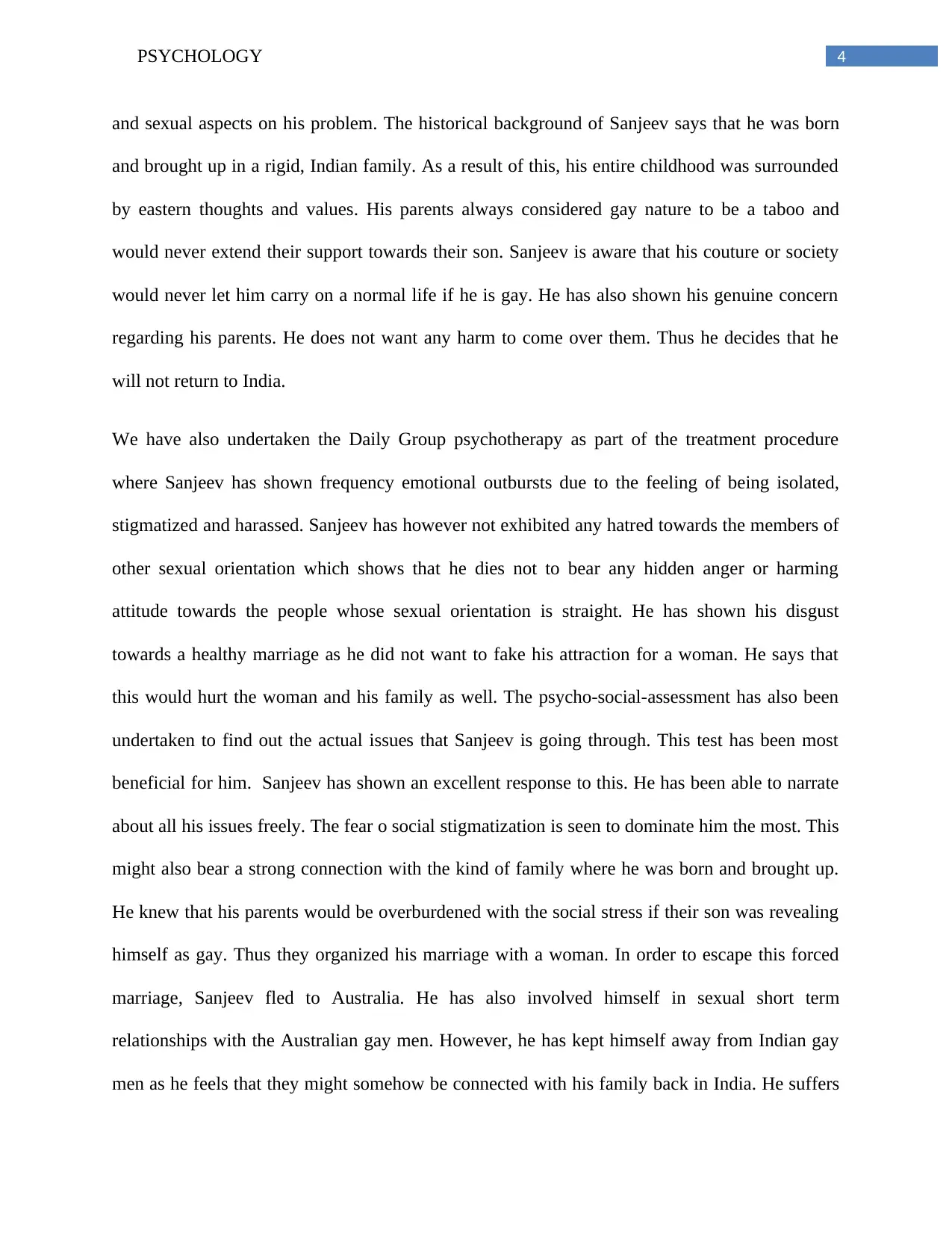
4PSYCHOLOGY
and sexual aspects on his problem. The historical background of Sanjeev says that he was born
and brought up in a rigid, Indian family. As a result of this, his entire childhood was surrounded
by eastern thoughts and values. His parents always considered gay nature to be a taboo and
would never extend their support towards their son. Sanjeev is aware that his couture or society
would never let him carry on a normal life if he is gay. He has also shown his genuine concern
regarding his parents. He does not want any harm to come over them. Thus he decides that he
will not return to India.
We have also undertaken the Daily Group psychotherapy as part of the treatment procedure
where Sanjeev has shown frequency emotional outbursts due to the feeling of being isolated,
stigmatized and harassed. Sanjeev has however not exhibited any hatred towards the members of
other sexual orientation which shows that he dies not to bear any hidden anger or harming
attitude towards the people whose sexual orientation is straight. He has shown his disgust
towards a healthy marriage as he did not want to fake his attraction for a woman. He says that
this would hurt the woman and his family as well. The psycho-social-assessment has also been
undertaken to find out the actual issues that Sanjeev is going through. This test has been most
beneficial for him. Sanjeev has shown an excellent response to this. He has been able to narrate
about all his issues freely. The fear o social stigmatization is seen to dominate him the most. This
might also bear a strong connection with the kind of family where he was born and brought up.
He knew that his parents would be overburdened with the social stress if their son was revealing
himself as gay. Thus they organized his marriage with a woman. In order to escape this forced
marriage, Sanjeev fled to Australia. He has also involved himself in sexual short term
relationships with the Australian gay men. However, he has kept himself away from Indian gay
men as he feels that they might somehow be connected with his family back in India. He suffers
and sexual aspects on his problem. The historical background of Sanjeev says that he was born
and brought up in a rigid, Indian family. As a result of this, his entire childhood was surrounded
by eastern thoughts and values. His parents always considered gay nature to be a taboo and
would never extend their support towards their son. Sanjeev is aware that his couture or society
would never let him carry on a normal life if he is gay. He has also shown his genuine concern
regarding his parents. He does not want any harm to come over them. Thus he decides that he
will not return to India.
We have also undertaken the Daily Group psychotherapy as part of the treatment procedure
where Sanjeev has shown frequency emotional outbursts due to the feeling of being isolated,
stigmatized and harassed. Sanjeev has however not exhibited any hatred towards the members of
other sexual orientation which shows that he dies not to bear any hidden anger or harming
attitude towards the people whose sexual orientation is straight. He has shown his disgust
towards a healthy marriage as he did not want to fake his attraction for a woman. He says that
this would hurt the woman and his family as well. The psycho-social-assessment has also been
undertaken to find out the actual issues that Sanjeev is going through. This test has been most
beneficial for him. Sanjeev has shown an excellent response to this. He has been able to narrate
about all his issues freely. The fear o social stigmatization is seen to dominate him the most. This
might also bear a strong connection with the kind of family where he was born and brought up.
He knew that his parents would be overburdened with the social stress if their son was revealing
himself as gay. Thus they organized his marriage with a woman. In order to escape this forced
marriage, Sanjeev fled to Australia. He has also involved himself in sexual short term
relationships with the Australian gay men. However, he has kept himself away from Indian gay
men as he feels that they might somehow be connected with his family back in India. He suffers
Paraphrase This Document
Need a fresh take? Get an instant paraphrase of this document with our AI Paraphraser
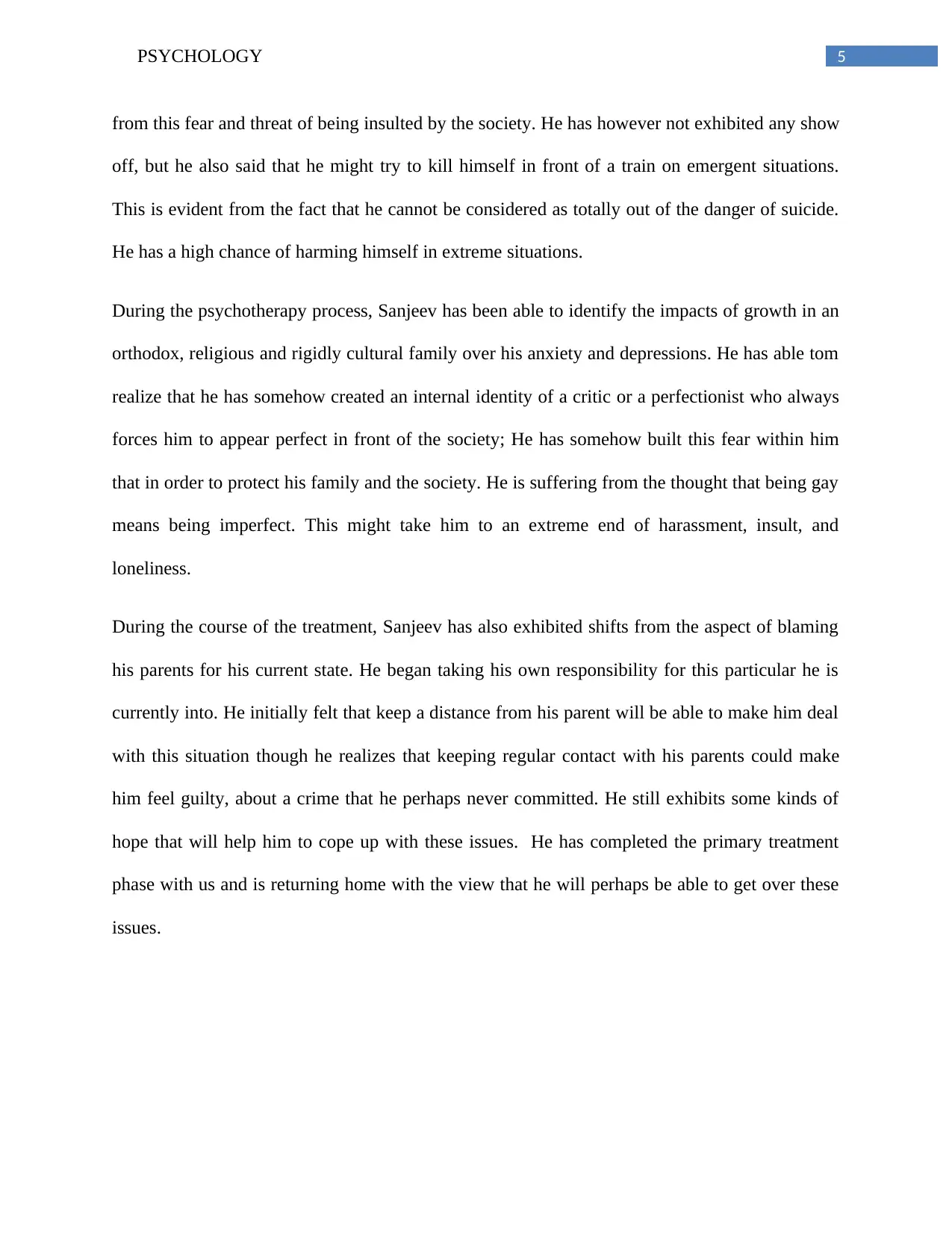
5PSYCHOLOGY
from this fear and threat of being insulted by the society. He has however not exhibited any show
off, but he also said that he might try to kill himself in front of a train on emergent situations.
This is evident from the fact that he cannot be considered as totally out of the danger of suicide.
He has a high chance of harming himself in extreme situations.
During the psychotherapy process, Sanjeev has been able to identify the impacts of growth in an
orthodox, religious and rigidly cultural family over his anxiety and depressions. He has able tom
realize that he has somehow created an internal identity of a critic or a perfectionist who always
forces him to appear perfect in front of the society; He has somehow built this fear within him
that in order to protect his family and the society. He is suffering from the thought that being gay
means being imperfect. This might take him to an extreme end of harassment, insult, and
loneliness.
During the course of the treatment, Sanjeev has also exhibited shifts from the aspect of blaming
his parents for his current state. He began taking his own responsibility for this particular he is
currently into. He initially felt that keep a distance from his parent will be able to make him deal
with this situation though he realizes that keeping regular contact with his parents could make
him feel guilty, about a crime that he perhaps never committed. He still exhibits some kinds of
hope that will help him to cope up with these issues. He has completed the primary treatment
phase with us and is returning home with the view that he will perhaps be able to get over these
issues.
from this fear and threat of being insulted by the society. He has however not exhibited any show
off, but he also said that he might try to kill himself in front of a train on emergent situations.
This is evident from the fact that he cannot be considered as totally out of the danger of suicide.
He has a high chance of harming himself in extreme situations.
During the psychotherapy process, Sanjeev has been able to identify the impacts of growth in an
orthodox, religious and rigidly cultural family over his anxiety and depressions. He has able tom
realize that he has somehow created an internal identity of a critic or a perfectionist who always
forces him to appear perfect in front of the society; He has somehow built this fear within him
that in order to protect his family and the society. He is suffering from the thought that being gay
means being imperfect. This might take him to an extreme end of harassment, insult, and
loneliness.
During the course of the treatment, Sanjeev has also exhibited shifts from the aspect of blaming
his parents for his current state. He began taking his own responsibility for this particular he is
currently into. He initially felt that keep a distance from his parent will be able to make him deal
with this situation though he realizes that keeping regular contact with his parents could make
him feel guilty, about a crime that he perhaps never committed. He still exhibits some kinds of
hope that will help him to cope up with these issues. He has completed the primary treatment
phase with us and is returning home with the view that he will perhaps be able to get over these
issues.
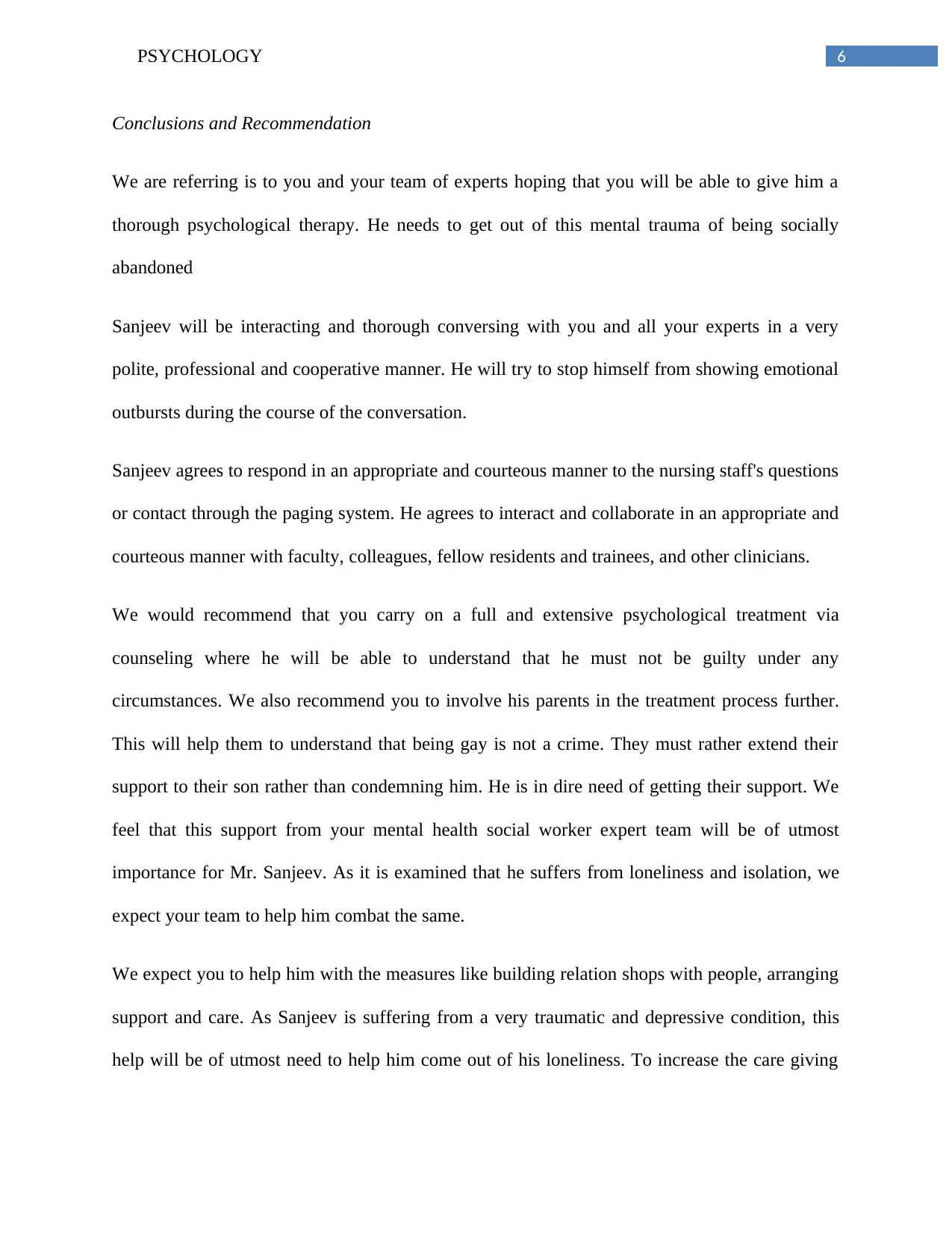
6PSYCHOLOGY
Conclusions and Recommendation
We are referring is to you and your team of experts hoping that you will be able to give him a
thorough psychological therapy. He needs to get out of this mental trauma of being socially
abandoned
Sanjeev will be interacting and thorough conversing with you and all your experts in a very
polite, professional and cooperative manner. He will try to stop himself from showing emotional
outbursts during the course of the conversation.
Sanjeev agrees to respond in an appropriate and courteous manner to the nursing staff's questions
or contact through the paging system. He agrees to interact and collaborate in an appropriate and
courteous manner with faculty, colleagues, fellow residents and trainees, and other clinicians.
We would recommend that you carry on a full and extensive psychological treatment via
counseling where he will be able to understand that he must not be guilty under any
circumstances. We also recommend you to involve his parents in the treatment process further.
This will help them to understand that being gay is not a crime. They must rather extend their
support to their son rather than condemning him. He is in dire need of getting their support. We
feel that this support from your mental health social worker expert team will be of utmost
importance for Mr. Sanjeev. As it is examined that he suffers from loneliness and isolation, we
expect your team to help him combat the same.
We expect you to help him with the measures like building relation shops with people, arranging
support and care. As Sanjeev is suffering from a very traumatic and depressive condition, this
help will be of utmost need to help him come out of his loneliness. To increase the care giving
Conclusions and Recommendation
We are referring is to you and your team of experts hoping that you will be able to give him a
thorough psychological therapy. He needs to get out of this mental trauma of being socially
abandoned
Sanjeev will be interacting and thorough conversing with you and all your experts in a very
polite, professional and cooperative manner. He will try to stop himself from showing emotional
outbursts during the course of the conversation.
Sanjeev agrees to respond in an appropriate and courteous manner to the nursing staff's questions
or contact through the paging system. He agrees to interact and collaborate in an appropriate and
courteous manner with faculty, colleagues, fellow residents and trainees, and other clinicians.
We would recommend that you carry on a full and extensive psychological treatment via
counseling where he will be able to understand that he must not be guilty under any
circumstances. We also recommend you to involve his parents in the treatment process further.
This will help them to understand that being gay is not a crime. They must rather extend their
support to their son rather than condemning him. He is in dire need of getting their support. We
feel that this support from your mental health social worker expert team will be of utmost
importance for Mr. Sanjeev. As it is examined that he suffers from loneliness and isolation, we
expect your team to help him combat the same.
We expect you to help him with the measures like building relation shops with people, arranging
support and care. As Sanjeev is suffering from a very traumatic and depressive condition, this
help will be of utmost need to help him come out of his loneliness. To increase the care giving
⊘ This is a preview!⊘
Do you want full access?
Subscribe today to unlock all pages.

Trusted by 1+ million students worldwide
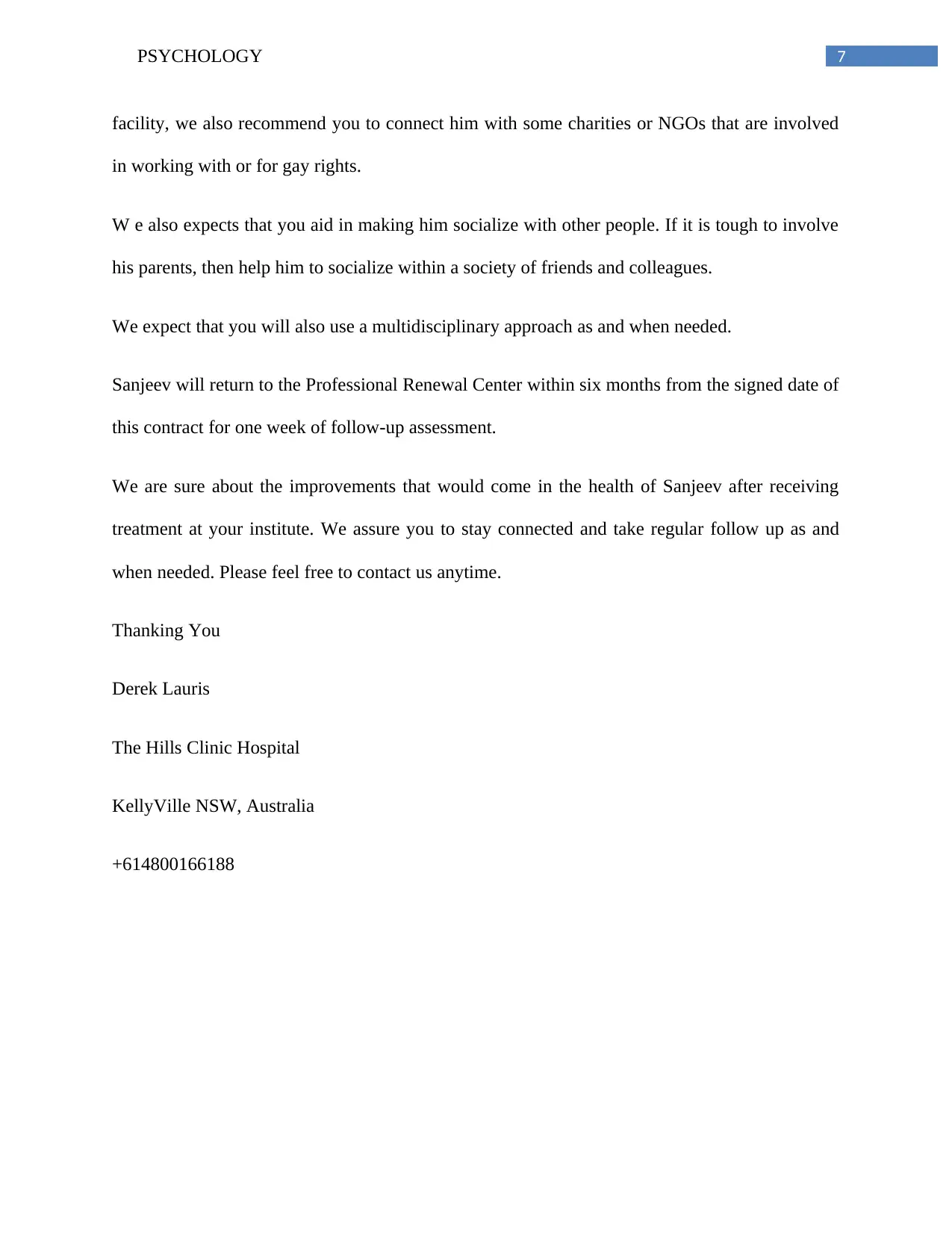
7PSYCHOLOGY
facility, we also recommend you to connect him with some charities or NGOs that are involved
in working with or for gay rights.
W e also expects that you aid in making him socialize with other people. If it is tough to involve
his parents, then help him to socialize within a society of friends and colleagues.
We expect that you will also use a multidisciplinary approach as and when needed.
Sanjeev will return to the Professional Renewal Center within six months from the signed date of
this contract for one week of follow-up assessment.
We are sure about the improvements that would come in the health of Sanjeev after receiving
treatment at your institute. We assure you to stay connected and take regular follow up as and
when needed. Please feel free to contact us anytime.
Thanking You
Derek Lauris
The Hills Clinic Hospital
KellyVille NSW, Australia
+614800166188
facility, we also recommend you to connect him with some charities or NGOs that are involved
in working with or for gay rights.
W e also expects that you aid in making him socialize with other people. If it is tough to involve
his parents, then help him to socialize within a society of friends and colleagues.
We expect that you will also use a multidisciplinary approach as and when needed.
Sanjeev will return to the Professional Renewal Center within six months from the signed date of
this contract for one week of follow-up assessment.
We are sure about the improvements that would come in the health of Sanjeev after receiving
treatment at your institute. We assure you to stay connected and take regular follow up as and
when needed. Please feel free to contact us anytime.
Thanking You
Derek Lauris
The Hills Clinic Hospital
KellyVille NSW, Australia
+614800166188
Paraphrase This Document
Need a fresh take? Get an instant paraphrase of this document with our AI Paraphraser
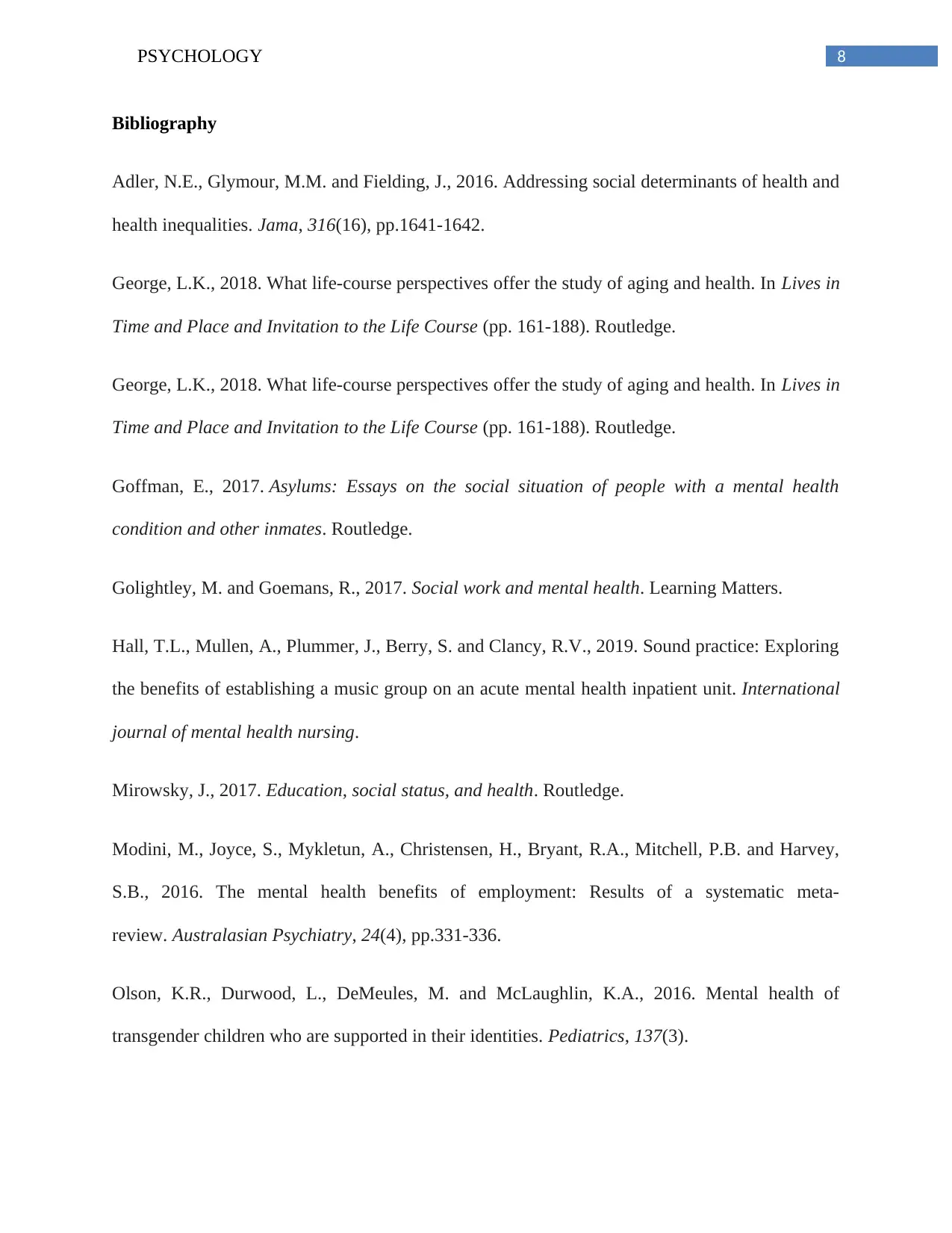
8PSYCHOLOGY
Bibliography
Adler, N.E., Glymour, M.M. and Fielding, J., 2016. Addressing social determinants of health and
health inequalities. Jama, 316(16), pp.1641-1642.
George, L.K., 2018. What life-course perspectives offer the study of aging and health. In Lives in
Time and Place and Invitation to the Life Course (pp. 161-188). Routledge.
George, L.K., 2018. What life-course perspectives offer the study of aging and health. In Lives in
Time and Place and Invitation to the Life Course (pp. 161-188). Routledge.
Goffman, E., 2017. Asylums: Essays on the social situation of people with a mental health
condition and other inmates. Routledge.
Golightley, M. and Goemans, R., 2017. Social work and mental health. Learning Matters.
Hall, T.L., Mullen, A., Plummer, J., Berry, S. and Clancy, R.V., 2019. Sound practice: Exploring
the benefits of establishing a music group on an acute mental health inpatient unit. International
journal of mental health nursing.
Mirowsky, J., 2017. Education, social status, and health. Routledge.
Modini, M., Joyce, S., Mykletun, A., Christensen, H., Bryant, R.A., Mitchell, P.B. and Harvey,
S.B., 2016. The mental health benefits of employment: Results of a systematic meta-
review. Australasian Psychiatry, 24(4), pp.331-336.
Olson, K.R., Durwood, L., DeMeules, M. and McLaughlin, K.A., 2016. Mental health of
transgender children who are supported in their identities. Pediatrics, 137(3).
Bibliography
Adler, N.E., Glymour, M.M. and Fielding, J., 2016. Addressing social determinants of health and
health inequalities. Jama, 316(16), pp.1641-1642.
George, L.K., 2018. What life-course perspectives offer the study of aging and health. In Lives in
Time and Place and Invitation to the Life Course (pp. 161-188). Routledge.
George, L.K., 2018. What life-course perspectives offer the study of aging and health. In Lives in
Time and Place and Invitation to the Life Course (pp. 161-188). Routledge.
Goffman, E., 2017. Asylums: Essays on the social situation of people with a mental health
condition and other inmates. Routledge.
Golightley, M. and Goemans, R., 2017. Social work and mental health. Learning Matters.
Hall, T.L., Mullen, A., Plummer, J., Berry, S. and Clancy, R.V., 2019. Sound practice: Exploring
the benefits of establishing a music group on an acute mental health inpatient unit. International
journal of mental health nursing.
Mirowsky, J., 2017. Education, social status, and health. Routledge.
Modini, M., Joyce, S., Mykletun, A., Christensen, H., Bryant, R.A., Mitchell, P.B. and Harvey,
S.B., 2016. The mental health benefits of employment: Results of a systematic meta-
review. Australasian Psychiatry, 24(4), pp.331-336.
Olson, K.R., Durwood, L., DeMeules, M. and McLaughlin, K.A., 2016. Mental health of
transgender children who are supported in their identities. Pediatrics, 137(3).
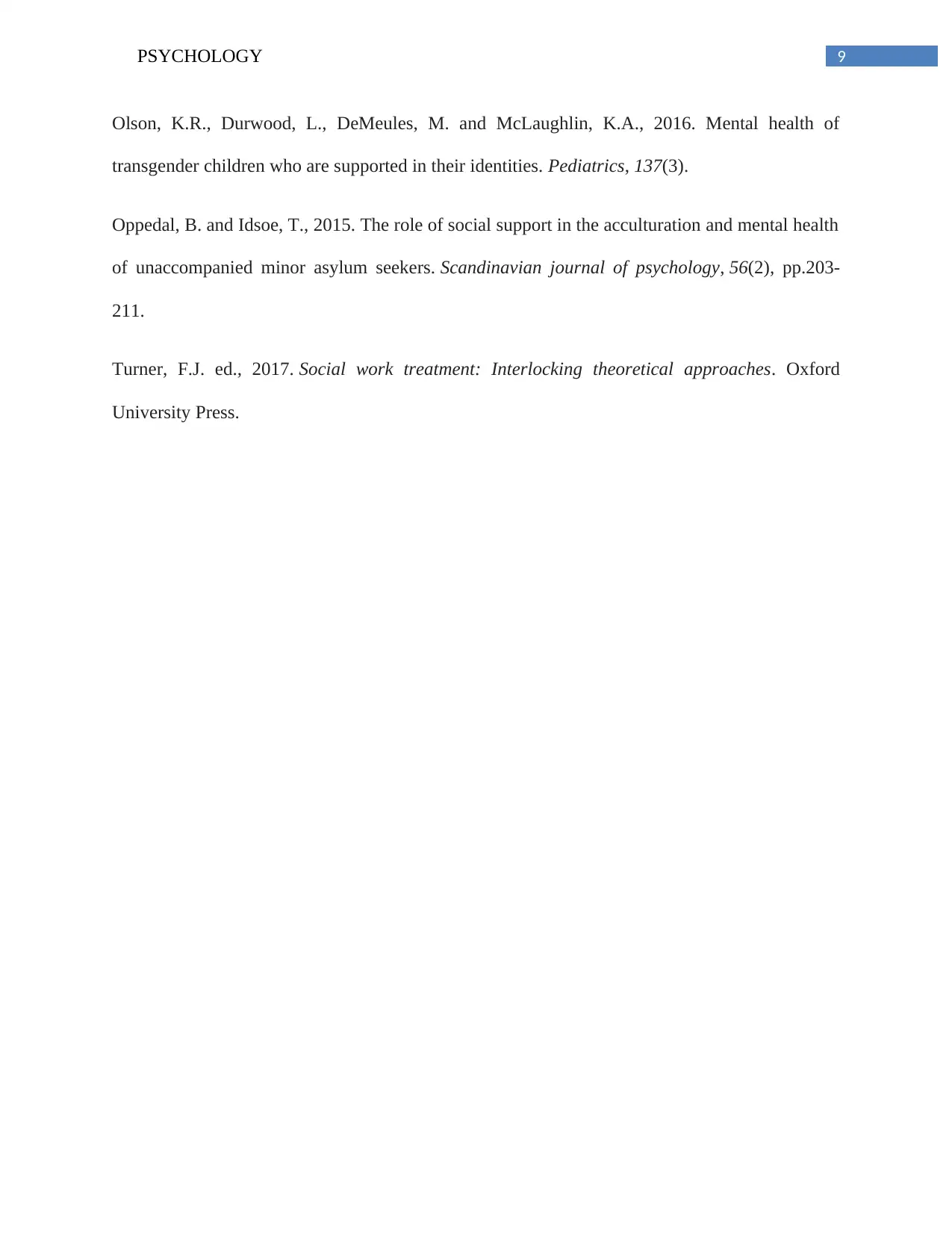
9PSYCHOLOGY
Olson, K.R., Durwood, L., DeMeules, M. and McLaughlin, K.A., 2016. Mental health of
transgender children who are supported in their identities. Pediatrics, 137(3).
Oppedal, B. and Idsoe, T., 2015. The role of social support in the acculturation and mental health
of unaccompanied minor asylum seekers. Scandinavian journal of psychology, 56(2), pp.203-
211.
Turner, F.J. ed., 2017. Social work treatment: Interlocking theoretical approaches. Oxford
University Press.
Olson, K.R., Durwood, L., DeMeules, M. and McLaughlin, K.A., 2016. Mental health of
transgender children who are supported in their identities. Pediatrics, 137(3).
Oppedal, B. and Idsoe, T., 2015. The role of social support in the acculturation and mental health
of unaccompanied minor asylum seekers. Scandinavian journal of psychology, 56(2), pp.203-
211.
Turner, F.J. ed., 2017. Social work treatment: Interlocking theoretical approaches. Oxford
University Press.
⊘ This is a preview!⊘
Do you want full access?
Subscribe today to unlock all pages.

Trusted by 1+ million students worldwide
1 out of 9
Your All-in-One AI-Powered Toolkit for Academic Success.
+13062052269
info@desklib.com
Available 24*7 on WhatsApp / Email
![[object Object]](/_next/static/media/star-bottom.7253800d.svg)
Unlock your academic potential
Copyright © 2020–2026 A2Z Services. All Rights Reserved. Developed and managed by ZUCOL.